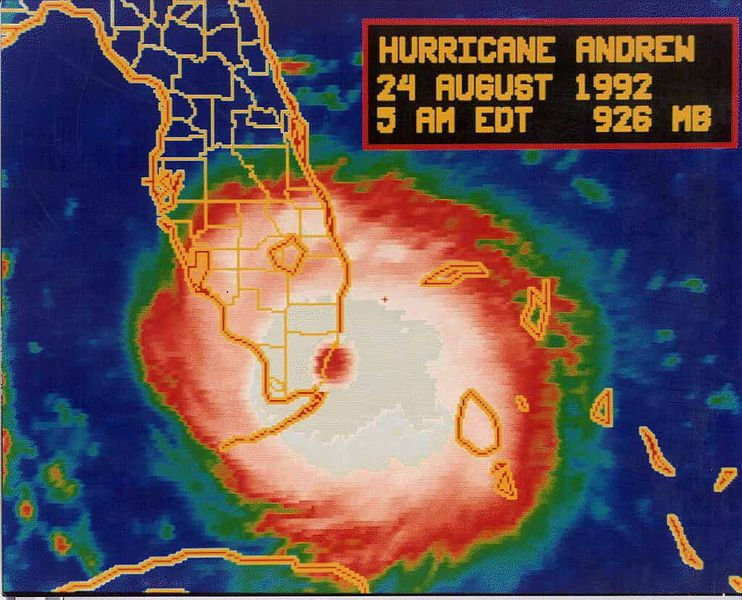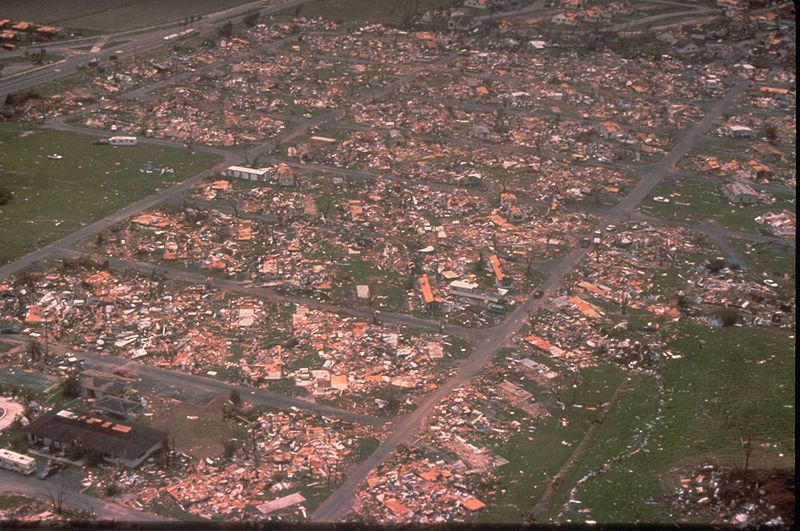An Apocalypse Heralds a New Beginning...
- Jamie A. Waters

- Aug 24, 2019
- 6 min read
Something I get asked a lot is why I decided to write a Post-Apocalyptic series.
The short answer? I didn’t.
The longer answer?
Our experiences shape who we are… and one of those experiences had a pretty significant impact on me.
Back in 1992, I was a teenager about to start high school. About a week before school was about to begin, we got hit with (at the time) one of the most destructive hurricanes in the history of the United States.

Hurricane Andrew made landfall as a Category 5 storm just a few miles south of my home on August 24th. The word 'devastating' doesn’t even come close to the experience.
We were living in a mandatory evacuation zone. Most of us had experienced hurricanes before, and we didn’t think much of this one. Everyone believed the storm wasn’t headed our way –at least, not until almost the last minute. The night of the storm, my family (and our pets) evacuated about 15 minutes north to higher ground. That decision probably saved our lives.
I remember staring out the window of my parent’s office building during the storm and watching as a metal roof ripped off a neighboring house and proceeded to fly down the street. The walls shook and groaned, and I remember wondering if we were going to survive.
I'll never forget the way the sky looked—the eerie green glow seemed almost otherworldly. The wind howled, and the smell of the sea surrounded me with every breath I took. It was power. Pure and undiluted power, and I was both awed and terrified by the raw fury of Mother Nature.
My father had run out during the eye of the storm to try to cover some of the windows. The plywood he’d used to board it up had been ripped off during the first half of the storm. I was terrified that the winds would kick up again before my dad made it back inside. It was extremely dangerous, but he managed to make it back inside safely. (PSA: Don't run outside in the middle of the storm... it's just stupid. Sorry, Dad, but it is.)
But it was the after effects that were the longest lasting…
Driving home the following day was almost impossible. My father had scouted ahead, trying to find the best route to get back to our house. With so much destruction, downed trees and power lines, and entire homes being destroyed, all recognizable landmarks were simply gone.
It looked like a bomb had gone off and decimated South Florida.
Our roof had been mostly ripped off, and not a room in the house was untouched. Carpeting was soaked--along with everything else. The sliding glass doors had all shattered and the storm had blown through the house, leaving a mix of shattered glass, broken furniture, and water. The screen enclosure on the patio had disappeared—some was in the pool and other parts were just gone. It became a game among the kids in the neighborhood to collect roof tiles in their yard and then try to match the house where it came from. (We never found some of the matching roofs.)
We were without power for 23 days, and it became very clear just how dependent we all are on electricity.
No hot water (and when you're under a boil water order, this is challenging).
No way to heat food (if you had any).
No air conditioning (a South Florida summer without AC isn't for the faint of heart--you get the heat AND mosquitoes). Heat stroke is a very real danger.
What became very clear, though, was how people change during a crisis. It’s in those moments that you get a good look at who someone is--and you'll never look at someone the same way again.
Gas stations were shut down. Not only was it impossible for the trucks to get into the hardest hit areas, but without electricity, the pumps didn’t work. People had only the gas they’d managed to acquire before the storm, and no one knew when we’d have access to more.
South Florida began operating strictly on a cash basis—and it wasn’t pretty.
It wasn't safe to drink the tap water, and bottled water was hard to find. Traveling anywhere (to a store or even away from your home) became challenging because of the lack of gas or due to streets being inaccessible from downed trees or power lines.
The first time we went to a grocery store after the storm, I was shocked. There was hardly any food or water. The grocery store had been hit hard too—missing most of their roof. Parts of the building were completely inaccessible and roped off for safety reasons. It was like a giant (very hot) warehouse with a few empty shelves. Nothing was refrigerated (remember, no one had power). Large pallets of water had been brought out, but it wasn't enough to cover the demand. People waited in huge lines in the stifling heat just to get a few items and no one knew when the next supply truck might appear. No checks. No credit cards. Cash only or you were out of luck.
The air of desperation was heavy.
With the banks and ATMs not having power or destroyed, you only had what you’d managed to take out before the storm.
I saw people band together to combine resources. I saw other people who were looking to make a quick buck. Friendships became strained, and cash was the only currency. It didn’t matter who you were or what sort of relationship you had—everything was sold to the highest bidder.
I heard countless horror stories from people I’d known all my life—my neighbor had been forced to hide in her bathtub with her small children. Her husband was a police officer, and he’d been on duty that night. Alone, she held a mattress over top of them in the bathtub while the storm passed overhead. She admitted that she wasn’t sure they were going to survive.
Everyone had a story—and they were all equally heartbreaking.
I was fortunate compared to many others. After the storm, my entire neighborhood pooled their resources. We had large cookouts (to get rid of our refrigerated food before it spoiled). For the kids, this was great... we could eat as much ice cream as we wanted because there was no saving it for later.
Another neighbor ran a pool company and had access to pool chemicals. The entire neighborhood pitched in to clean one of the pools so it could be used throughout the community.
We had the one working phone in the entire neighborhood, and we had random people coming in and out of our house at all hours to use our phone to let their loved ones know they were alive and safe. I'll never forget crawling out of a sleeping bag one morning and seeing some strange man walk in the front door without knocking and head to the phone. He lived several blocks away, and I probably never would have met him if it weren't for this hurricane.
This had become our new 'normal'.
The National Guard drove down our street to distribute MREs (Meals Ready-to-Eat). I remember my little brother and his friends running down the street after them, cheering them on as they handed out food. These men and women were true heroes. They served as reminder that we weren't alone, even though we frequently felt like it.
Through this experience and losing almost all of our material possessions, I learned that all this ‘stuff’ isn’t really important. It’s sad to lose photographs and other memorabilia, but it’s not the end of the world. It’s the people—our families, friends, and other loved ones that are truly important. Everything else is replaceable.
This experience also launched a renewed interest in survival skills. My parents had always encouraged learning these things, but after Hurricane Andrew, I became a much more diligent student. You never think about what might happen, but you should. I’ve lived it. I survived. And now I’m better prepared if anything should ever happen again.
So when I started writing The Omni Towers, I pulled some of my personal experiences (the camaraderie and banding together for survival) and incorporated those things into the ruin rat camps. To them, it was the people who were important. They didn’t care about material possessions, except how it helped them to survive.
Kayla, Ariana, and Valentina may be fictional characters, but their story is representative of something more. Our experiences help shape who we are, and these strong women are inspiring to me in their efforts to overcome all odds and survive.
Because at the end of the day, that’s what we’re all trying to do too.
Survive.





Comments